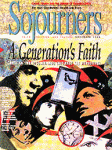We started at the beginning, with Eve. As the music of Pachelbel’s Canon quietly underscored the reading of the creation story from the Bible’s first chapter, we both reveled and rested in the knowledge that we are all—women and men—created in God’s image. Then I sent 24 retreatants prayerfully off toward sleep that Friday night.
The mood changed abruptly on Saturday morning. The corruptions of God’s good intentions for humanity come home at the first venture beyond Genesis 1. We stepped into the heart-wrenching story of Sarah and Hagar, rivals trapped by a patriarchal system that named them property and valued their worth by their capacity to bear sons. We wandered amid the desolation of Ruth and Naomi, widows who survived first by their devotion to one another and then by working the system to secure a husband for Ruth.
We mourned with Bathsheba over the lust of a king who demanded her and over the punishing death of her son. We tried to imagine her fear, her grief, her powerlessness—all absent from the story that has gone down in history as "David’s great sin."
Then we waded into the most difficult waters. We read the biblical stories of the rape of Tamar and the sacrifice of Jephthah’s daughter, the dismemberment of the Levite’s concubine and the seizing of the young Midianite women as spoils of war. Tears were shed, and intimate stories shared of violation and fear from our own lives. And we knew that these women could offer strength.
ON SATURDAY AFTERNOON we turned a corner toward hope. We heard the wondrous story of Puah and Shiphrah, unknown to most of the retreatants until that moment. Strong, clever, and courageous, these Hebrew midwives refused to kill the male babies against the orders of the pharaoh.
We learned of Mahlah, Noah, Hoglah, Milcah, and Tirzah, five sisters who changed Hebrew law. Before Moses and the whole assembly, they challenged the rule that said that only sons could inherit land—and God agreed with them, according to Numbers 27. We claimed Vashti as a sister. Refusing to parade before her husband the king and his drunk and lustful cronies, she asserted her dignity and created an uproar throughout the kingdom.
We looked at the strength of Mary, who understood even before Jesus was born that the rich were about to be put off their thrones and the poor exalted. We cheered the courage of the woman with the 12-year hemorrhage who dared to walk among the crowds and touch Jesus’ hem. Outcast, lonely, "unclean," she overcame her fear and claimed her healing. An incest survivor among us shared that this was her conversion passage. She understood that Jesus had allowed himself to be emptied of his power for this woman—and that he was willing to do the same for her.
We read of the faithfulness of Mary Magdalene, beloved disciple and first witness to the resurrection. We applauded the pastoral gifts of Priscilla and the works of mercy of Dorcas, two models of leadership among women in the early church.
And then we came upon the Woman Clothed With the Sun in Revelation 12. Pregnant, bearing all the power of creation, she escaped the dragon who sought to devour her child, her hope, her dreams. We talked about the dragons in our own lives and in our world—the insecurities and injustices that keep us from rising up on the wings of eagles, as this woman did, in the glory of God.
On Sunday morning we gathered around a simple table, bearing a cloth and a candle. We reread the story of Jephthah’s daughter from Judges 11. Destined for sacrifice because of her warrior father’s reckless vow, this young woman bargained for two months of her life in the company of her women friends in the wilderness. The last verse is a proclamation that every year for four days the daughters of Israel observed a ritual of lamentation. A story that began with a man’s unwavering vow ended with women’s undying devotion. In the midst of tragedy, the women had the last word, ensuring that the memory of Jephthah’s daughter would not be forgotten.
We imagined that the women went back to the mountains, perhaps to a place where they had cradled and comforted their now-dead sister, to weep, to sing, and to dance—mourning and celebrating the vulnerability and strength of womanhood. Perhaps they built an altar, as we were about to do, and turned their prayers to a mother God, consecrating their bond as her daughters.
Around the base of our table were stones that I had gathered the evening before. One by one, accompanied by the eerily haunting music from the movie The Mission, each retreatant stepped forward and picked up a stone. Naming a woman who had been a mentor, heroine, or survivor of discrimination or abuse, each added the stone to the pile growing on the table. Tears flowed freely as emotional stories were related of tragedy and triumph.
After each of us had added several stones, we stood and offered a prayer of remembrance and celebration. Upholding their names, we invited the biblical women who had been our companions for the weekend into our midst and enfolded them in our circle. We ended our retreat with this affirmation: "By the grace of God we claim their strength and dignity and courage—and ours. Amen."
JOYCE HOLLYDAY is a former associate editor and now a contributing editor for Sojourners. "Clothed With the Sun: Biblical Women and Us" is available as a weekend retreat, workshop, or sermon. For more information, or to arrange an event, write to Joyce Hollyday at P.O. Box 423, Brevard, NC 28712.

Got something to say about what you're reading? We value your feedback!